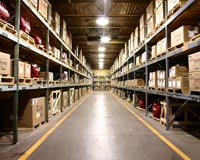Andy Gulliford, chief operating officer, SEGRO Developers are already playing an important role in stimulating economic recovery and growth. Constructing new buildings and regenerating vacant industrial land leads to the creation of jobs and the subsequent boost to local economies, while giving support to SMEs and local infrastructure projects will encourage growth, helping British industry to remain competitive.
This year at SEGRO we have completed developments for customers such as Lonza, Ragus Sugars, and Gyron. At Heathrow, we completed the 106,500 sq ft UK headquarters for DB Schenker Logistics which is also their main airfreight hub for the UK. We are also constructing a 95,000 sq ft facility for Rolls-Royce. This will become its London Heathrow Service Centre, which, when fully operational, will employ up to 80 people, providing specialist maintenance and support services for commercial aero engines.
At Park Royal, West London, SEGRO is developing 160,000 sq ft on a speculative basis at our Origin site. The former Guinness factory is an example of derelict, older industrial land being regenerated for modern use. This demand for modern, light industrial space is partly being fuelled by the growth of “urban logistics”, which needs to be located close to its customer base in large conurbations. Replacing old-style buildings with modern units is a trend we expect to see continuing. On the Slough Trading Estate we have been replacing older industrial units with more modern facilities through prelets and speculative building. Since the start of 2007, we have built 1.1m sq ft at the Trading Estate, helping to maintain its position as one of the most vibrant business locations in the UK.
It’s not just large-scale developments that promote growth. SMEs are a vital part of our economic landscape and the Enterprise Quarter, on Slough Trading Estate, has been designed to support companies like these. We offer Enterprise leases, on a three-year term, with a break option after a year, inclusive of service charges and insurance. This type of arrangement has helped companies such as Kosei Pharma UK Limited to grow. Last year they occupied 3,200 sq ft and they now occupy 10,400 sq ft.
Having a trained and skilled workforce is just as important in promoting growth. ‘Slough Aspire’, housed on the trading estate, aims to give people the training and work-based skills they need. Developed by SEGRO, it is one of the country’s most innovative training projects, supported by companies like Mars, Lonza, Polycom, and O2, as well as the local council and industry bodies.
Inward investment plays a crucial role in stimulating growth and Hytera was the first Chinese company to move onto the Slough Trading Estate. Recently more than 100 Chinese companies visited Berkshire to explore opportunities, showing that despite the economic slowdown there is interest from companies based in the Far East looking to the West for growth. Developers need to be ready to actively develop and support these links.
Companies also have a key role to play on bodies like LEPs and Chambers of Commerce, by supporting projects that will generate growth. An example is the direct rail link along the western corridor to Heathrow – WRAtH, where, through involvement with the Thames Valley LEP, companies successfully lobbied for this link to be given the go-ahead. This link will be vital in generating future growth and prosperity in the Thames Valley.











